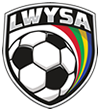
LWYSA Referees | |
Information: FAQ | |
| Calendar | |
| Contact Us | |
| FAQ | |
| - | Ask a Question |
| - | New Referee |
| Help | |
| Locations | |
| Matches | |
| Ref Evaluation | |
| Search | |
| Standings | |
| Team Calendar | |
Offside - Introduction
- Law 11: Offside
- LWYSA begins enforcing Law 11, the rule concerning Offside, in all U10 matches. The Offside law, while being one of the shortest laws (only the corner kick is shorter) is one of the most misunderstood laws and is a frequent cause of poor sideline behavior.
The Entry Level Referee course devotes over an hour to teaching this rule, including many many examples. So, referees are taught this rule in great detail. But, as you will see in this much simplified tutorial, there offside law requires that the referee observe many factors that, while quite simple, involve numerous players and knowledge of what is going on in several points on the field...all at the same time. Only after they have considered all these points can they decide whether or not they will blow their whistle and penalize somebody for being Offside.
Those who are on the sideline should remember that most referees DO actually understand the law quite well. They simply see things differently than the sidelines. While referees certainly do get the call wrong from time to time, many is the team that has reviewed a tape of the game, only to see that the referee actually was correct, or that the "obvious" situation that a parent saw during a game, wasn't obvious at all.
- The Tutorial
- We are grateful that the organization creating this tutorial has chosen to make it available. Watch carefully. Hopefully, by the time you are done you will have an appreciation for the challenge faced by the referee making the Offside call, and you will understand how the "biased" sideline would have an even greater challenge getting the call correct. Many thanks to Coach Tony for letting us know about this tool.
Click here to view the Offside_Tutorial.

- Being Involved In Play
- Many people now understand that a player can only be ruled offside if they are in an offside position AND if they become involved in play by:
- interfering with an play;
- interfering with an opponent; or
- gaining an advantage by being in that position
It is especially important to note that, in many cases, the A/R is being asked to DELAY making a signal until a period that is likely to be long after the sidelines want a decision made. A/R's are reminded that few spectators know the nuances of the Law and few understand that a DELAY in making a signal to the referee is being a GOOD A/R. They are encouraged to resist any temptation to yield to the demands of the uninformed crowd that they raise their flag sooner.
Regardless of your understanding of the law after reading any of these resources, parents and coaches must respect the decisions of the referees making these decisions.
| Copyright © 2026 by LWYSA Referees/refereewebmaster@lwysa.org |